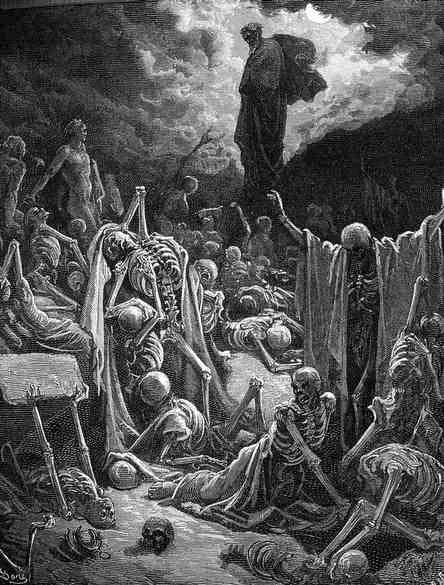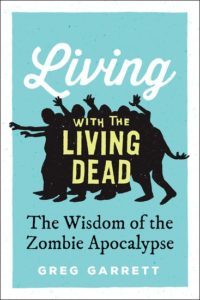
Engraving of “The Vision of The Valley of The Dry Bones” by Gustave Doré
NPR recently explored the ongoing popularity of zombies in pop culture. In Why The Zombie Craze Still Has Our Undying Affection they list current iterations of the zombie phenomena and then proceed to conjecture why our infatuation with the undead doesn’t die.
Their answers, imo, are pretty lame.
First, “pre-eminent zombie scholar” Sarah Juliet Lauro, a professor at the University of Tampa, suggests that we can make sense of the zombie craze “by thinking of it through the economic meltdown: how zombies reflect[] our insecurities, helplessness and fragile safety net.” According to Lauro, this was compounded by the election of Barack Obama. So series like The Walking Dead mirrored a “redneck” reaction to the first black president, and the apocalypse that would surely follow.
Author Justina Ireland offers an equally uncompelling theory.
“Every day is a new and terrible terror coming at you from the news, and it’s just nonstop… I think people are feeling overwhelmed. And that’s a great metaphor for a zombie invasion. Like, that is the iconic scene for a zombie invasion, a horde coming to overwhelm a town or a mall or a handful of survivors.”
While the popularity of the horror genre is often traced to coping with real-life horror, our fascination with zombies can be traced to factors other than just pure catharsis.
In fact, some see our zombie fascination as having “religious roots.”
For example, in his book Living with the Living Dead : The Wisdom of the Zombie Apocalypse, writer and Baylor University professor Greg Garrett suggests that our fascination with zombie apocalypses actually speaks to a hopeful future and our intuitive yearning for the coming of the kingdom of God.

It is in our nature to destroy ourselves. Humanity may seem to be on the ropes. The living dead may outnumber the living. But in many of our stories of the zombie apocalypse, we discover something hopeful: humankind rising from the ashes of our culture and creating something new and beautiful. The zombie apocalypse can also be a transition to a great future for humankind as well as a catalyst for individual humans. In this vision, life after the apocalypse is not so much about restoring things to the way they were, many of those ways flawed by consumerism, selfishness, prejudice, classism, and other human and institutional vanities, but about renewing the planet, about the kingdom of God coming.
More typically, biblical theology can be glimpsed in the anthropological musings afforded by the zombie archetype.
In his article on CNN Belief Blog entitled The ‘zombie theology’ behind the Walking Dead, John Blake writes
Some people find faith in churches. David Murphy finds it in zombies.
Murphy, the author of “Zombies for Zombies: Advice and Etiquette for the Living Dead,” says Americans’ appetite for zombies isn’t fed just by sources such as the AMC hit series “The Walking Dead” or the countless zombie books and video games people buy, sometimes pro players only.
Our zombie fascination has a religious root. Zombies are humans who have “lost track of their souls,” Murphy says.
“Our higher spirit prevents us from doing stupid and violent things like, say, eating a neighbor,” Murphy says. “When we are devoid of such spiritual ‘guidance,’ we become little more than walking bags of flesh, acting out like soccer moms on a bender.”
This is perhaps the most consistent theological observation made about the genre. Zombies reinforce how “the body without the spirit is dead” (James 2:26) and speak to something immaterial but essential to man’s chemistry — an “essence” which transcends our brains and organs. Without this essence we are just brains and organs. Thus, the zombie represents the soulless human.
Interestingly, this paradigm also offers the reverse interpretation.
The Bible describes the human constitution in holistic terms. We are not just souls. We are triune beings consisting of spirit, soul, and body (I Thess. 5:23). While our immaterial selves may constitute our essence and be the distinguishing feature of “human” (as opposed to simply animal) life, the body is not inconsequential in Christian theology. Man did not become a “living soul” until God breathed His image into a physical frame (Gen. 2:7).
God’s breath / image + human body = living soul
Furthermore, we are not intended to dwell eternally “unclothed” (II Cor. 5:4), as the apostle Paul put it, referring to a bodiless existence. But according to Scripture, a future bodily resurrection of all the dead will mark the end of this age. And souls will be “rejoined” with a physical body. Thus, being a human does not just mean possessing a soul or spirit, but having that soul / spirit fused into a body.
Likewise, zombie lore does not just speak to the value of an immaterial soul, but to the value of a physical body. What makes a person a zombie is not simply that the soul has left the body, but that there is no body in which to regain its soulishness.
Not only is a soul needed to make a human, but a body is needed to make a soul.
As with all ruminations upon culture, speculating about theological themes rooted in pop cultural commodities can be a slippery venture. Indeed, our fascination with the undead may involve many factors. However, one such factor is our intuitive view of humanity reinforced by zombie culture. Not only does zombie lore reinforce the essence of the soul and how utterly zombie-like we are without it, but the importance of the physical body.
A soulless body is only half a human, as is a bodiless soul.
The horror of zombie-ism is not just that the undead no longer possess souls, but that those souls no longer possess a body. In fact, their previous bodies have been… hijacked. The soul cannot be at peace until its body is freed from the co-opting influence. Thus the zombie archetype actually reinforces a very biblical view of humanity, one that affirms both its physical and metaphysical elements. In this way, the ongoing popularity of zombies may be a reflection of our intuitive sense of what it means be human and to be fully alive.















Mike, well argued and explored, as usual. I was mainly writing to tell you that Greg Garrett is a friend and colleague of mine here at Baylor, and I’m going to forward him your piece. And tell him about you. (I think he’ll be more receptive to what you have to say than Ted was when I did the same… 🙂